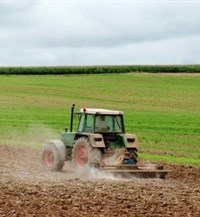Bayer and AGCO join forces to drive the Future Farm in Zambia
Smart farming
The Future Farm project will focus on the development of the future farm concept and agricultural training in Zambia, by training farmers in seeding, crop projection, mechanisation and food projection. The project is also aimed at driving the mutual development of community projects on the farm and in the region - with a particular focus on maize, soy and wheat.

"Sustainable production of high quality food should be a top priority on the development agenda for Africa," says Dr Klaus Eckstein, CEO and head of CropScience for Bayer Southern Africa. "While strides have been made, long-term investment and commitments to local agricultural enterprises - both small-hold and commercial farmers - are essential to building supply chains for sustainable food sources that will meet demand and future export potential. In fact, to provide enough food for ourselves and our livestock well into the future, agriculture must become more efficient - which means we need to become smarter in terms of how we view farming today, and this is exactly what the Future Farm project is about."
Improved cultivation methods, responsible use of crop protection options and seeds tailored to local growing environments become critical. "The integrated approach has proven to work better than the current stand-alone solutions and will revolutionise agriculture even further, with the farms of today becoming the future farms of tomorrow," adds Eckstein.
Training and education
As part of the agreement, Bayer is poised to bring innovation to the project. The company will focus on providing training on pest, weed and disease identification and will also supply and provide education regarding the responsible use of crop protection remedies to both small scale and commercial farmers.
Bayer will also leverage local projects and employees to bring together expertise and the partners necessary to develop the future farm training centre concept while also coordinating the agriculture value chain through targeted demonstrations and solutions. AGCO will focus on solutions, providing training on mechanisation and food projection, new innovation and assist with the identification of other organisations that may participate in the project and assist with establishing an agricultural supply industry through their worldwide knowledge of agriculture.
Resources and partnerships
Zambia has vast agricultural potential. Yet despite a favourable climate, fertile land and 40% of the water resources in the entire Southern African region, that potential is yet to be fully tapped. Of the 58% of land suitable for agricultural production, only 14% is currently under cultivation and despite bumper maize harvests, agriculture makes up only 20% of GDP while employing roughly 85% of the population. In fact, more than 350,0002 people in the country are food insecure, that is, they do not have access to a regular supply of healthy food.
"The effective and sustainable intensification of agriculture through partnerships with farmers, is paramount to eliminate hunger and increase the country's food security. This will require embracing the interconnections and complexities of our food systems, constant collaboration between Government and the agricultural and science communities to cultivate solutions that will yield a sustainable supply of safe, nutritious and plentiful food sources for years to come. It's all about Science for a Better Life. Welcome to the farm of the future," concludes Eckstein.
Related
Why Americans care so much about egg prices – and how this issue got so political 18 Mar 2025 The “biggest trout farm in Africa” and the failed R5,000 community fund 17 Mar 2025 Urban food gardens produce more than vegetables, they create bonds for young Capetonians – study 3 Feb 2025 Kenya’s farmers have lots of digital tools to help boost productivity – how they can be made more effective 21 Jan 2025 SA fruit industry launches pest monitoring centre 3 Dec 2024 Toyota honours young farmers driving SA’s agricultural success 26 Nov 2024























